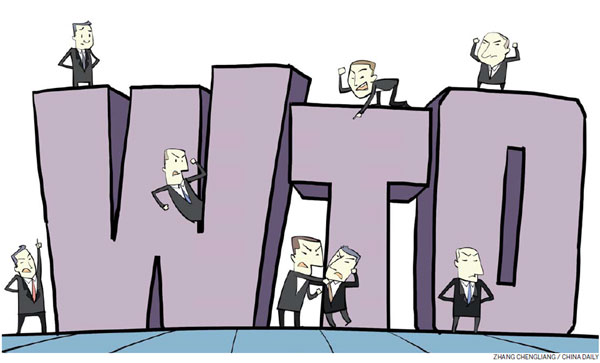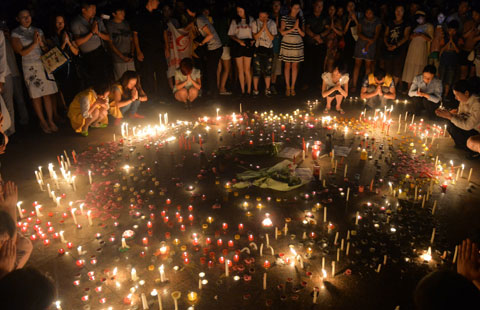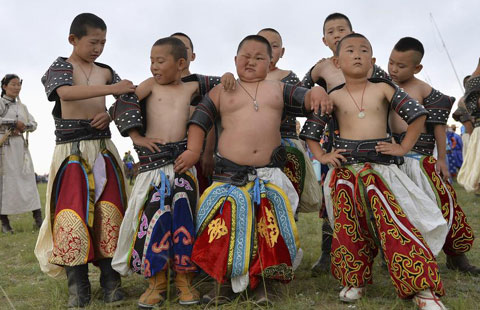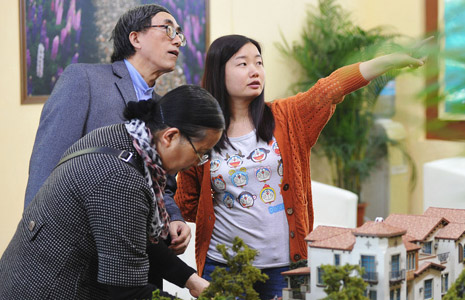WTO: A waste of time and money?
Updated: 2014-08-15 10:20
By Giles Chance(China Daily Europe)
|
|||||||||||


After two decades of failure, perhaps we should prepare for a world with less cooperation
At the end of last month in Geneva, the 157 members of the World Trade Organization met to put the finishing touches to an important agreement to streamline global trade by speeding up processes, reducing cost, and replacing office work with more efficient computerized systems.
The deal, known as the Trade Facilitation Agreement, is a small part of the broad trade agreement aimed at when new global trade negotiations started at Doha in 2001. It was set to be the first global agreement passed by the WTO since it was created in 1995.
But on July 31, the WTO General Secretary Robert Azevedo announced that the deal could not be signed, after all, because India insisted on special conditions for allowing developing countries to stockpile goods and subsidize food.
While WTO members including the United States and Australia expressed their frustration, another question was being asked: After two decades of trying but failing to reach a global agreement on reducing tariffs and facilitating trade, is global agreement possible, even on something apparently as important to every country as trade?
Is the WTO now wasting its time and our money?
Although international trade has not historically played the fundamental development role in China that it has in much smaller countries such as Holland and Britain, trade's importance to China did greatly increase during the Asian crisis in 1997-98.
At that time Zhu Rongji, China's former premier and economic reformer, midway through a wrenching economic restructuring at home, saw foreign demand for China-manufactured goods as the answer to China's growth problem.
Within a few years, Western multinationals had developed global supply chains centered on China.
Consumers in America and Europe at that time were developing a dependence on household goods made in China.
Today, although China is developing a different growth model, based mainly on Chinese rather than foreign consumer demand, the country still accounts for over 10 percent of world trade, more than the United States, and ranks in the top 4 countries worldwide for the import and export of commercial services.
However successful China's switch to domestic demand as an economic driver may be, foreign trade will always remain an essential part of China's economy.
As a result, China has a huge interest in trade liberalization, often turning to the WTO to settle trade disputes with its major trade partners.
Economic welfare depends on the exchange of goods and services between different persons and countries, to get something which cannot otherwise be obtained.
If I can receive something from you that I cannot produce, or that you can produce more efficiently than I can, and in exchange you take something from me that I produce more efficiently than you do, then we are both better off.
Our available resources increase, to be used either to produce more, or to consume more of what we like or need - or both. Other parties that you or I deal with are able to increase their exchanges with us, because our resources increase. They therefore benefit as well, as a result of our exchange.
The first person to demonstrate the importance and subtlety of the argument for free trade was the English politician David Ricardo, who in the early 1800s wanted to show his countrymen that free trade was preferable to protectionism because it made them richer.
In his example, Ricardo used England and Portugal as the two countries, and textiles and wine as the two commodities.
Even though the Portuguese might be able to produce both textiles and wine more cheaply than the English, as long as both countries could import a product from the other at a price lower than it cost to produce the commodity themselves, then by trading with each other the English and the Portuguese would both increase their wealth.
Only when the imported cost rose above the cost of the domestically produced product would trade no longer be worthwhile.
So if tariffs on imported Portuguese wine were raised high enough, the English would find it worthwhile to produce wine themselves for their own consumption, even though England was not suited for wine production.
In 1950, world exports amounted to 5.5 percent of global GDP. By 2011, according to the IMF and the WTO, world exports had grown to 27 percent of global GDP.
Since 1980, world trade has expanded at an average rate of 7 percent per year, four times faster than world GDP.
By expanding exchanges worldwide, global trade has played a critical role in China's (and the world's) wealth and productivity gains of the last three decades.
In particular, developing economies have benefited from increased trade, with their share of global exports rising to 47 percent in 2011, from 34 percent in 1980.
This economic development could not have occurred without a global institution to set and enforce global rules for international trade by general agreement.
Today's World Trade Organization, based in Geneva, grew in 1995 out of the General Agreement on Trade and Tariffs founded in 1948, which itself emerged after a world war that resulted from the national protectionism and global depression of the 1930s.
China's agreement to join the WTO in 1999, after 15 years of negotiations and in the face of stiff resistance from powerful groups within China, was a watershed moment both in China's and in the world's economic development.
The large economic gains made by Chinese manufacturers and by Western consumers that have followed owe a lot to the existence of the WTO, which acted as an honest middleman and reassured both Chinese and the major Western traders that such a deal could work to everyone's advantage.
Today, the WTO's place is gradually being taken by bilateral trade arrangements between politically aligned countries or groups of countries.
The trust between different, far-flung countries, which the WTO encouraged, is being undermined as the major players turn to trade as a means to extend their geopolitical control.
The United States is the architect both of the Trans-Pacific Trade Partnership and the Transatlantic Trade and Investment Partnership, neither of which currently includes the world's largest trader, China, which, for its part, is focused on developing its own bilateral free trade agreements as its entry to Europe (Switzerland) and to North American trade pacts (Costa Rica), and on reawakening its old trading relationships with central and western Asia.
The self-reinforcing economic growth and increased international cooperation which the GATT and WTO oversaw look like they are becoming a thing of the past, unless the WTO can reassert itself.
Perhaps we are living now in a world in which global agreement on anything has become impossible.
If so, then some of the benefits of freer trade will be lost, and the world economy will not grow as fast in the next two or three decades as it did before.
Everyone will lose, but small emerging countries will lose most, because often they are not important or powerful enough to gain much from regional or unilateral free trade arrangements.
The other big losers will be the Western European developed countries that face economic stagnation - France, Belgium, Italy and the United Kingdom - who need all the economic stimulus from trade that they can get.
China, the world's largest trader, will lose, too, but has the muscle to establish beneficial regional free trade agreements, and can find other growth avenues for the time being.
Let us hope that sense prevails over self-interest at the WTO. But even though the world community seems to be becoming smaller every day, after two decades of failure at the WTO, perhaps we should prepare for a world with less cooperation and more confrontation.
The author is a visiting professor at Guanghua School of Management, Peking University. The views do not necessarily reflect those of China Daily.
(China Daily European Weekly 08/15/2014 page12)
Today's Top News
British Chinese call for memorial to WWI workers
Pollution control set as priority for APEC meeting
Swimmer nabs silver at Gay Games in the US
China exports to Russia to surge
Chinese economic crime suspects repatriated
Ukraine deaths double in 2 weeks
Sensitive times in the making
Chinese film fans mourn for star
Hot Topics
Lunar probe , China growth forecasts, Emission rules get tougher, China seen through 'colored lens', International board,
Editor's Picks

|

|

|

|

|

|





